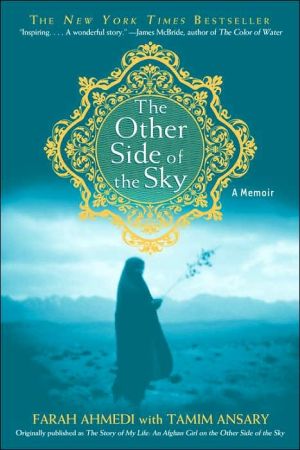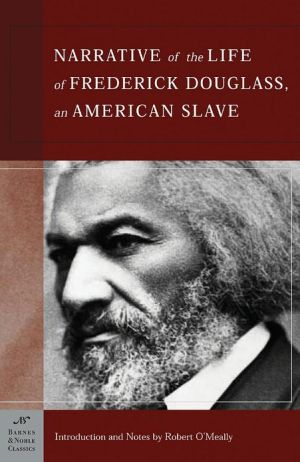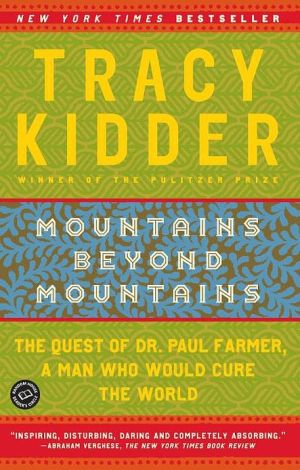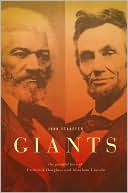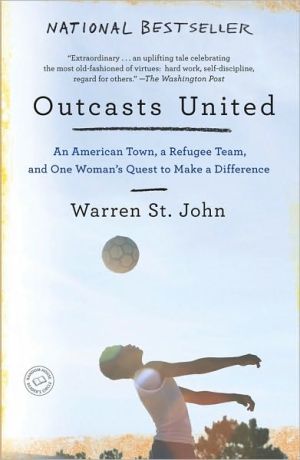Other Side of the Sky
Farah Ahmedi's "poignant tale of survival" (Chicago Tribune) chronicles her journey from war to peace. Equal parts tragedy and hope, determination and daring, Ahmedi's memoir delivers a remarkably vivid portrait of her girlhood in Kabul, where the sound of gunfire and the sight of falling bombs shaped her life and stole her family. She herself narrowly escapes death when she steps on a land mine. Eventually the war forces her to flee, first over the mountains to refugee camps across the...
Search in google:
"I was late to school, and that's all I could think about. I started across the field. And then suddenly a fire flashed in my face and the earth seemed to move beneath my feet. I remember a shower of soil and then nothing. I woke up on the ground, surrounded by a crowd, men and boys...no women. They were all staring down at me with huge eyes. Their lips were moving, but I could hear no voices. All I heard was a loud ringing in my ears." Farah Ahmedi is born into the world just as the war between the mujahideen and the Soviets reaches its peak in Afghanistan. Bombs are falling all over her country, and her native Kabul is swelling with hundreds of thousands of people looking for homes and jobs. The sounds of gunfire and fighter planes are as normal to Farah as the sounds of traffic or children playing are to a schoolgirl in America. When Farah steps on a land mine on her way to school, her world becomes much smaller than the dreams and hopes in her heart. She begins to learn -- slowly -- that ordinary people, often strangers, have immense power to save lives and restore hope. The Story of My Life: An Afghan Girl on the Other Side of the Sky recounts an epic journey. It deftly interweaves a childhood in Afghanistan, where the classrooms are naked chambers with only chalkboards on the walls and are filled with more students than seats (and no books), with an American adolescence, where teenagers struggle to decide whether to try out for school plays, whom to take to the homecoming dance, and where to go to college. In Kabul, they cancel school because of rockets and bombings; in Chicago, Farah might have a snow day. In Kabul, a schoolgirl wears a black dress and a white headscarf; in America, girls need the right jeans and trendy tops. Thanks to a number of good people who crossed her path at critical moments, Farah is thriving. She may be haunted by her past, but she is no longer enslaved by it. She is actively enjoying the realization of her childhood dreams; she's an Afghan American, free to learn, work, support herself, and choose her own path. She'll graduate from high school soon and is being recruited by some of the best colleges in the world. Farah is living proof that not only can the human heart endure, it can also thrive. Even in war, there are miracles. Even when limbs are amputated, we are whole. Even in refugee camps, dreams come true. Even when fathers and siblings die young, there is love. The Story of My Life is our new great American memoir. Los Angeles Times The Story of My Life, [is] in a certain sense, the world's most literate reality show.
Prologue\ Alyce wanted me to share the story of my life. I told her that I wasn't ready, that it was too soon. I'm not even nineteen years old, and I haven't achieved anything yet. But Alyce said that with a life like mine, surviving itself is an achievement-just surviving.\ I don't know if she's right. When I look back at my childhood in Afghanistan, it seems so far away and long ago. Back then I thought I would grow up and grow old in the city of Kabul, surrounded by my big, complicated, loving family. Little did I know I would lose most of them before I turned fourteen.\ As a child, gazing at the high walls around our home compound, I longed to see what lay on the other side of my city. I never dreamed that I would see our home reduced to rubble and would end up living on the other side of the world, in the suburbs of a city called Chicago.\ But in the end, I have decided to tell this story because it is not mine alone. It is the story of many people. Probably, you have read the numbers. So many people have stepped on land mines, so many have gotten hurt by war, have lost their families, fled their homes. Each of us has a story. What happened to me-both the bad and the good-really does happen to people.\ I say "the bad and the good" because out of my losses have come tremendous gifts as well. Looking back, I see that my life could have ended so many times, except for unexpected strangers who reached out to me in loving kindness. After I lost my leg, I thought I could never know happiness again, and yet that very loss opened the world to me in strange ways and showed me wonders that I had never imagined.\ I have seen mydreams crushed, but new ones have sprouted in their place, and some of those dreams have even come true. I have lost loved ones but not love itself. That's what my story is about, I think. That's the story I want to share with you now, the story of my life, so far.\ Text copyright (c) 2005 by Nestegg Productions LLC\ Chapter 1: The Gondola\ Even though ten years have passed, I still find it difficult to talk about the land mine. I don't like to think about it either, but on that score I don't always get to choose. One time last summer my new American friends, Alyce and John, took me to a carnival here in the suburbs of Chicago, where I live now with my mother. What a dazzling sight it was for a seventeen-year-old girl who had lived most of her life in Afghanistan and in the refugee camps of Pakistan. I had never seen anything like it-the colors, lights, noise, and spectacle. I ate cotton candy and tried my luck at a few sideshow games, and then we went to look at the rides.\ We came to one called the Gondola. It was shaped like a large boat suspended from two long poles. It had many rows of seats, all facing the center. The boat was swinging back and forth when we arrived. Each time it swung in one direction, the seats on that side lifted way up, maybe a hundred feet into the air. Then it swung the other way, and the seats on the other side lifted up. It was kind of like a massive swing that went from side to side instead of forward and backward.\ As the ride got going faster, people started screaming, but Alyce told me they were having fun. She said the ride scared them, but they wanted to be scared. That was what they enjoyed about the ride.\ I told Alyce I wanted to try it. Alyce wasn't so sure about that, but I insisted I could handle it. So she bought some tickets, and we both climbed aboard. We went to the very end of the boat, to the seats that rose the very highest, because we wanted the full effect, the biggest scare-the most fun. The man came through and locked down a bar in front of us. That bar keeps you from falling out when the ride is going. Of course, you can still get out by climbing over the bar, but when the Gondola is swinging back and forth at full speed, who would want to?\ At first the ship swung slowly. It didn't go very far in either direction. But gradually, the boat went faster and swung farther. Each swing took our seats higher, and when the boat reached the top of its swing, it seemed to pause. For an instant I felt weightless. Then, when it swung the other way, I felt as if I was falling fast. My heart came into my throat, and my throat dropped down into my stomach. It was scary but exhilarating, and I was loving that feeling of speed and of the wind in my hair.\ But then at the peak of the ride, just as the boat reversed direction and our seats began to fall, the machinery sent off some kind of spark. And when that spark flashed in my eyes, it triggered something. I dropped through a trapdoor into some other reality. Suddenly, I wasn't in America on a carnival ride. I was on the ground, looking up into the sky and the sun. I had fallen out of that day and into a moment ten years in the past. Above me what I saw was that ring of faces, the people who had gathered around to gawk at me after the land mine went off-it was as real to me as the clouds overhead.\ So I started screaming, right there on the Gondola ride, just like I did on that terrible day. "Why don't you help me? Why are you all just looking at me like that? Help me, someone help me!"\ It was that scene, exactly. I tried to get up, as I had that day. I wanted to be whole again. I scrambled to get away from the horror of what had happened-except that I was not really on the ground in Afghanistan. I was at a carnival in Wheaton, Illinois, on the Gondola, struggling to get out of my seat on a ride that was going a hundred miles an hour, back and forth, up and down. Thank God Alyce was there by my side, as she has been by my side so often in these last few years. Thank God she knew at once what I was about to do, and she flung her arms around me and kept me in my place and shook me and called into my ear, "Wake up, Farah! Wake up!"\ I came back to consciousness. The ride was still going, and I knew vaguely where I was, but only through the fog of a terror that I couldn't blink away. I yelled, "Stop the ride, stop the ride!"\ But of course they didn't stop the ride. They never stop the ride.\ I screamed, but my screams attracted no attention. Everyone was screaming. They expect people to scream on carnival rides. I was doing nothing newsworthy. If I had managed to get out of my seat and over the restraining bar, yes, then someone would have noticed. If I had managed to jump from the Gondola ride at the peak of its motion, yes, I would have made the news: ONE-LEGGED AFGHAN GIRL JUMPS FROM CARNIVAL RIDE. But it didn't happen because Alyce was there to save my life-but then, Alyce has done that in a lot of ways, big and small, since we met two years ago.\ The ride finally slowed down, and the world around me changed from a blur of motion to a field of happy crowds enjoying a summer day. I said, "Oh my goodness, what happened?" I looked around and said, "Oh my goodness! I'm not in Afghanistan. It's not that day. I'm in America." Nothing was broken, I was told. The machine was supposed to make sparks.\ Even now, I wonder what triggered my flashback at that carnival. Was it the heart-swelling sensation of falling? Was it the light that flashed in my eyes and then morphed into the sunlight of that awful day, the sunlight that shone through that ring of horrified faces? I wish I knew so I could get ready for the next time or avoid tripping another switch that turns some ordinary moment into a horrible waking dream.\ Nowadays I don't dream about my leg very much. It's not like those first few weeks or even months after it was amputated, when I used to dream that I was riding a bicycle or running around in our yard in Kabul or just walking.\ In those dreams I would say, Oh my gosh, look at this! I can ride a bicycle. I'm running. What was I worrying about? My leg is just fine! I don't have those kinds of dreams anymore. Now when I take off my prosthetic leg at night, I feel like I have always been this way. Although my mind remembers another time. They say that amputees can feel their missing limbs, but I never have. I don't feel pain, absence, presence, or any other sensation where my leg used to be. My body knows it's gone. It's just my mind that sometimes forgets. The other night I woke up thirsty and wanted a glass of water, so I automatically started to get out of bed. I almost fell, and then I remembered that I had to put on my prosthesis.\ My mother and I are safe now, living in Carol Stream, Illinois. We have good food and decent shelter, and I have a dear friend. I should be contented now. I should be happy every day, every minute, every instant. It troubles me that I'm discontent and sad so much of the time.\ In that last hour of school each day I'm so tired that my body hurts, and I say to myself, As soon as I get home, I'll go to sleep, first thing. But when I get home, I feel restless. Then I have to finish my homework. After that I eat dinner and watch TV. By ten o'clock I'm so sleepy that I hate TV, even if a good show is on. I turn it off and think, Now, finally, I'll go to sleep. As soon as my head touches the pillow, however, sleep scatters to the winds. The anxieties begin to churn. If I was lonely that day, I'll feel it more intensely now. If I did poorly on a test, I'll begin to worry about it now, with the lights out and the darkness all around me.\ And then some little thing that happened during the day will trigger a memory from my past. I'll get to ruminating about where I was then and where I am now. I'll start to mull over how it would be if my father were alive today, if Afghanistan had not plunged into war, if I were living in Kabul now, if I still had my whole family. Maybe I would be married or at least have prospects. Probably, my life would be calm. I would not have to struggle so hard each day. My mother would have grandchildren from her sons. My father would be happy, and his business would be growing.\ I think of all that could have been.\ And yet our life here is good. We have everything we could ask for, God be praised. I don't have to worry about money. We get disability from the government. I just have to go to school. I come home to a nice apartment. I see my mom and know she is feeling much better. Then Alyce calls, and we tell jokes and trade stories about our day. I feel loved.\ How can I possibly feel unhappy sometimes? I have no right to sorrow. And yet at times I find I can't enjoy what I have. I come home through empty streets to our quiet little apartment, to my mother, who sits in her chair, rocking relentlessly hour after hour, lost in her thoughts, and I start to feel so lonely. I eat something, and the food seems to have no flavor. I worry that I've lost the capacity for excitement that I used to have in such abundance as a little girl, living in Afghanistan with my family.\ I remember the mealtimes of my childhood-I don't mean the great festival days, just the ordinary, everyday meals. My parents served all five of us children off of a single platter. When they said, "Dinner is ready," we rushed the tablecloth, hands unwashed. They sent us back. "Wash your hands, children!" And then we'd all be scrambling and jostling around the water pot, splashing one another and giggling. I remember the excitement of dinnertime. Five of us siblings clustered around one platter, banging elbows, chattering and gobbling. My father would tell us sternly, "It's time to eat, not talk!" And then if we were hungry, we'd worry that the others would eat up all the food before we got our portion, because we were sharing from a single platter. So we'd all settle down to win the competition, each of us cramming the food away by the fistful as fast as we could. Crowding and gobbling-it was so much fun to be one of five children eating together from a single platter. How we laughed! The taste of the food that I ate eleven or twelve years ago remains in my mouth more vividly than the food I eat today, because that's actually the memory of a kind of fun I can never have again: I'm remembering the flavor of being with my family, part of one big, loving group. We aren't that big group anymore. It's down to just the two of us now-my mother and me.\ That's probably why I have so much trouble falling asleep at night. I turn out the lights, and my head fills with thoughts that begin to circle madly through my mind. Then I imagine a big eraser inside me where my thoughts are. I rub that eraser across the bustle and buzz, rubbing out one memory after another, until only silence remains. Only then can I sink into the luxury of sleep.\ But sleep never lasts. Sooner or later a nightmare always wakes me. In the middle of the night I can't find my eraser. My heart is pounding in my chest. I have to find another strategy for calming down. If I was dreaming about my mother dying, I listen for her breath. The sound of her coughing calms me down. Or I hear her pacing restlessly in our small apartment in the dark, as she used to do so often in our early days in America, and even that sound reassures me. I think, She is still alive. And then I can go back to sleep.\ I have nightmares every night. I can't get away from them.\ Sometimes I dream that we've gone back to Pakistan for a visit and I have lost my passport. I'm searching desperately through our baggage, strewing our clothes about, crying out loud, What am I doing here? Why did I come back?\ Or I dream that we're in Pakistan and staying too long. Our tickets have been stamped for a certain flight. They'll expire if we don't get to the airport in time. But everyone keeps trying to delay us. My mother doesn't understand my sense of urgency. I'm crying out, Let's go, let's go, before something happens, before they shut the doors! But she's saying, Wait, I can't find my scarf. Wait, we have to say good-bye to your aunt. Wait, we can't leave without visiting your grandparents....\ Sometimes I dream that Alyce won't talk to me. I've made her angry. I plead with her. I say, This isn't right, why are you angry with me? I didn't do anything wrong, don't be mad!\ Or I see that Alyce has made a new friend. She's striking up a conversation with my cousin. I fly into a rage at that cousin. Why is she talking to my Alyce? Get away from her, she's my friend! And in real life my poor cousin isn't even in America. She's stuck back there in dire straits, and yet in my dreams I curse her.\ Sometimes I dream that a stranger is hitting me. I want to hit back, but I can't. And then suddenly I find my mother waking me up. She tells me I was sitting up in bed, making slapping and punching motions with my arms. Oh, we laugh about it! She paints such a comical image of me, punching away at nothing and growling, "I'm going to slap you so hard!"\ I dream that I have fallen into a river. A woman up on the riverbank is dangling a handkerchief down to me. I try to grab it, but it's too short. I try to grab it, but it's too flimsy-it tears in my grasp. I try to grab it, and I get it in my clutches; I start climbing up it, hand over hand, but the handkerchief keeps stretching out. No matter how hard I climb, my feet never leave the water. In fact, I sink deeper with that tattered handkerchief still in my grip. I feel the water in my mouth...in my nose....\ Every time my mother gets sick during the day, I dream that night that she is dying. I scream, Take her to the hospital! Someone help us! People have gathered around to watch us. Their eyes bulge out strangely. They find us interesting. Their eyes bulge because we fascinate them, but none of them reaches out. They seem to think we are figures in a glass case or a movie. They don't seem to realize we are right there, close enough to touch. They could take our hands. I shout at them, We exist!\ Then I realize no one is going to help us. It's all up to me. I lift my mother in my arms. I will have to carry her to the hospital by myself. But as I struggle through the door, she begins to grow. My mother gets bigger and heavier in my arms. I can't carry her! I don't have the strength! She gets longer. Her feet drag on the ground, her head drags, I can't hold up her middle. I'm just too small and getting smaller. I wake up screaming.\ Some of my dreams are so vivid, so full of color, so real that I can't believe I'm dreaming. When I wake up, my eyes are wet with tears. My heart is banging against my ribs. I tell myself, It was only a dream, Farah, only a dream....And it might or might not comfort me. It depends, because I do dream about dead people so much. I stroll with them. I talk with them. I hold them in my arms. They are all alive inside me, still. My father and grandmother appear to me, and they are reaching out and beckoning to me, murmuring softly, Come, Farah. Come be with us now! During the dream these images do not frighten me. I love my father, and I'm so glad to see him. His voice comforts me. But when I wake up in the morning, I remember what people say about the dead beckoning to you in your dreams: that it means you are going to die soon yourself. That's when I tremble.\ But it's all in my head. That's what I have to keep telling myself. I'm safe in America now...and besides, they're not all terrible, the dreams I have. Lately, I dream that I've grown wings sometimes. I have feathers. I can fly. I love those dreams! I'm soaring overhead, and people are all pointing to me and exclaiming, Look! It's Farah! She can fly! Farah can fly!\ I wake up with a glad heart then and feel that I am flying in some sense: flying into my future-and yet-the past won't let me go. Not completely. Not yet.\ Text copyright (c) 2005 by Nestegg Productions LLC
\ Los Angeles TimesThe Story of My Life, [is] in a certain sense, the world's most literate reality show.\ \
